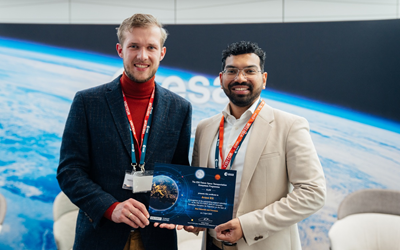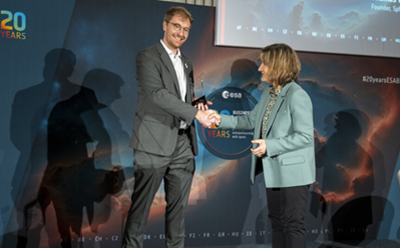Inspired by electrification and robotisation in aerospace and aviation, cleantech entrepreneur Franc Mouwen aspires to include the world of excavators and drills in this progressive trend with his startup and one of our latest incubatees Forcefox. Time to replace diesel with electrically driven machines, ‘I want to contribute to achieving a sustainable world.’
With years of experience under his belt in the field of cleantech, Franc Mouwen (46) previously launched a startup focused on the storage of sustainable energy. More than a year ago, he began an extensive study of the world of heavy construction machinery such as excavators and drills – a field not yet permeated by cleantech, data and automation and where everything still runs on diesel. Mouwen explains, ‘A McKinsey report spoke volumes in this regard. The report revealed that while productivity is increasing in nearly all sectors, construction is facing a decline in productivity. Moreover, the current hydraulic systems are not capable of making technological advances, such as field robotics.’
Learning from aerospace
The aviation and aerospace industries have been dedicated to the transition to power-by-wire technology for the past ten years to replace central hydraulic systems. This reduces weight and energy consumption and simplifies assembly and maintenance. Mouwen and his team translate these insights and apply them to the construction site. Forcefox is developing an electro-hydrostatic actuator which can be used for heavy construction material. Mouwen continues, ‘We are utilising, for example, the magnetic wobbling gear developed for aerospace applications to replace traditional gears. This development is much more reliable and robust in space making which is especially beneficial for our heavy-duty applications.’
Total cost of ownership
‘We have’, adds Mouwen, ‘a significant environmental issue owing to an economy largely based on oil and gas. The proven damage of emissions means that action must be taken sooner rather than later. For me, this is a cause worth fighting for, and I believe in entrepreneurship as a means of contributing. With ForceFox I want to reduce diesel usage and, in doing so, reduce emissions. On the other hand, ForceFox wants to offer a healthy business model; the total cost of ownership of our product must be demonstrably better.’
Team and customer launching
Coincidentally, Mouwen resides in Noordwijk and has often frequented the SBIC. With the start of ForceFox, he viewed registration for an incubator programme as a logical step. ‘Time spent in discussion with other small companies about your proposition and your business structure is invaluable. They’re all like-minded individuals committed to developing and marketing their aerospace invention. Look, the chance of succeeding with a startup is small. You’ve got to grab every opportunity to advance. We currently have a three-person team and we’re working on a prototype with partners and universities that we will soon pitch to potential clients. All of our simulations are functional.’
‘The market is evolving: robotics, data, electrification; things are moving and we’re taking part. I don’t expect a large market player to partner with us right off the bat. We are primarily focused on specialised products. Efficient electrification, for example, presents a business case if you look at underground construction and savings on ventilation costs. For future bans on emissions and noise pollution in urban areas, our clean solution can also be applied.’


